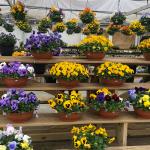With the onset of spring plants are leaving production greenhouses, or being received from vendors, and moving to retail areas. One of the most important steps in maintaining plant quality is receiving them properly. Immediately after receiving plants, open cases to let out heat that may have built up during transit and inspect plants carefully for pests, diseases, or damage before placing them for sale. Water to help settle plants and media in the pots before putting them on display. Be sure to water the plants thoroughly; do not just wet the top of the soil. Display plants as soon as possible, and handle carefully avoid bruising the leaves and flowers or damaging the stems and flower buds as plants are being moved around.
We always hope for quick turnover, but some plants stay in retail areas for prolonged periods, thus we must take steps to maintain quality during this time. Some relevant tips:
- Keep plants well-watered: Plants in retail areas require regular, gentle watering. Too little or too much water can have a detrimental effect. Inspect plants regularly early in the morning and early afternoon and irrigate as needed. If possible group plants by watering requirements. Always watch the weather forecast; if cloudy/rainy weather is expected, reduce watering to avoid overwatering. Overwatered plants can be prone to root diseases.
- Keep plants fertilized: To keep plants looking good at point of sale, continue to provide them adequate nutrition. Regularly inspect plants for nutrient deficiency symptoms and fertilize as needed. The most common nutrient deficiency symptoms of plants in retail settings are nitrogen deficiency, phosphorus deficiency and pH induced iron deficiency or toxicity symptoms.
- Nitrogen deficiency shows up as lower leaf yellowing; in most cases because plants are not being fertilized enough. Plants that are not properly watered, however, can also show symptoms of nitrogen deficiency. Utilizing a fertilizer injector can help to address this problem.
- Phosphorus deficiency usually shows up as reddening or purpling of lower leaves. In many cases, phosphorus deficiency symptoms are not caused by lack of phosphorus, but a lack of phosphorus uptake. This is more common early in the season when temperatures are cool and plants are placed outside, as plants in cold soil have difficulty taking up phosphorus. Adding phosphorus will not fix the problem, but moving the plants into a heated space will. Adding phosphorus may cause plants to stretch when temperatures warm up.
- pH induced nutrient problems: Some nutrients are more available or less available based on substrate pH. Petunias, calibrachoa and other iron inefficient plants exhibit iron deficiency when substrate pH goes above 6.2; geraniums and other iron efficient plants exhibit iron toxicity when substrate pH goes below 6.2. Using a neutral fertilizer that is neither potentially acidic or potentially basic is the ideal way of managing nutrient problems in a retail setting.
- Protect plants from pests and diseases: Always perform an initial inspection of incoming plants and continue to monitor them on a regular basis. Also be sure to keep the retail area clean. Regularly remove and discard old unsightly or diseased plants and other plant debris. Put them in a covered trash can and dispose of them well away from the retail area, as plant debris can serve as a reservoir for pest problems. Regularly scout for and remove weeds in the retail area and around the perimeter, as weeds may harbor pests and disease pathogens. If plants were grown using biological pest control, continue applying biological controls in the retail area.
- Keep plants well groomed: Inspect plants at least three times a week and remove all brown or yellowing leaves, dead leaves, or broken stems. Remove plants that are looking old and dead or dying and replace them with new plants. This will keep displays looking fresh and attractive.
For more information, refer to the following links:
http://e-gro.org/pdf/2016_531.pdf
https://ag.umass.edu/greenhouse-floriculture/fact-sheets/caring-for-plants-in-retail-setting
- Geoffrey Njue, Extension Specialist, UMass Extension Greenhouse Crops and Floriculture Program.

